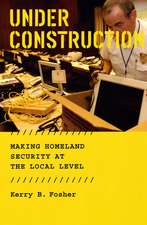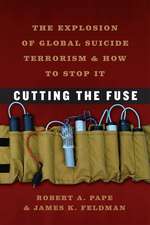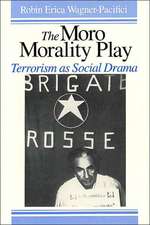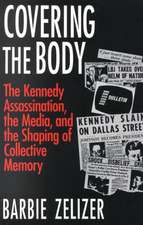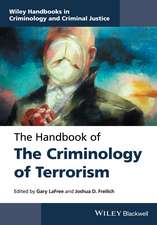The Making of Terrorism
Autor Michel Wieviorka Traducere de David Gordon Whiteen Limba Engleză Paperback – 30 sep 2003
Revised and reissued in light of recent events, this classic and now increasingly important book is an exception in the literature on terrorism. Based on complex observations of actual movement participants, Wieviorka's book addresses a broad spectrum of terrorist activity—from Italian left-wing terrorists to Basque nationalist groups to the international terrorism of Palestine and the Middle East. The result is an incisive analysis of what terrorists believe and what they hope to achieve through their actions. For this new edition, Wieviorka adds new material that remaps the state of terrorism after the events of 2001.
Preț: 296.10 lei
Nou
Puncte Express: 444
Preț estimativ în valută:
56.66€ • 59.16$ • 46.89£
56.66€ • 59.16$ • 46.89£
Carte tipărită la comandă
Livrare economică 04-18 aprilie
Preluare comenzi: 021 569.72.76
Specificații
ISBN-13: 9780226896533
ISBN-10: 0226896536
Pagini: 408
Dimensiuni: 152 x 229 x 23 mm
Greutate: 0.54 kg
Ediția:1
Editura: University of Chicago Press
Colecția University of Chicago Press
ISBN-10: 0226896536
Pagini: 408
Dimensiuni: 152 x 229 x 23 mm
Greutate: 0.54 kg
Ediția:1
Editura: University of Chicago Press
Colecția University of Chicago Press
Notă biografică
Michel Wieviorka is a professor at the Ecole des Hautes Etudes en Sciences Sociales and the editor of the journal Cahiers Internationale de Sociologie.
Cuprins
Preface
Foreword
Acknowledgments
Part One - A Sociological Analysis of Tradition
1. Social Movement, Antimovement, and Terrorism
2. Intellectuals and Terrorism
3. The Media and Terrorism
4. Live Terrorism
5. Inversion
6. Conclusion to Part One
Part Two - Social Movements and Marxism-Leninism: The Italian Phenomenon of Leftist Extremist Terrorism
7. Fifteen Years of Armed Insurgency
8. The Social, Political, and Intellectual Roots of Armed Insurgency
9. A Sociological Intervention with Terrorists
10. Conclusion to Part Two
Part Three - Nation, Class, and Revolution: The Basque Phenomenon of ETA
11. A History of Armed Struggle in Southern Euskadi
12. An Analysis of ETA Violence
13. The Work of the Veteran Group
14. The Work of the Separatist Group
15. Conclusion to Part Three
Part Four - International Terrorism
16. The Palestinian Movement
17. Palestinian Terrorism
18. Lebanese Actors: A General Analytical Model
19. The Disinherited, Communal Violence, and Terrorism
20. Conclusion to Part Four
General Conclusion
Appendix: On Methodology
Abbreviations
Movements, Organizations, and Some Proper Names
Glossary
Notes
Bibliography
Index
Foreword
Acknowledgments
Part One - A Sociological Analysis of Tradition
1. Social Movement, Antimovement, and Terrorism
2. Intellectuals and Terrorism
3. The Media and Terrorism
4. Live Terrorism
5. Inversion
6. Conclusion to Part One
Part Two - Social Movements and Marxism-Leninism: The Italian Phenomenon of Leftist Extremist Terrorism
7. Fifteen Years of Armed Insurgency
8. The Social, Political, and Intellectual Roots of Armed Insurgency
9. A Sociological Intervention with Terrorists
10. Conclusion to Part Two
Part Three - Nation, Class, and Revolution: The Basque Phenomenon of ETA
11. A History of Armed Struggle in Southern Euskadi
12. An Analysis of ETA Violence
13. The Work of the Veteran Group
14. The Work of the Separatist Group
15. Conclusion to Part Three
Part Four - International Terrorism
16. The Palestinian Movement
17. Palestinian Terrorism
18. Lebanese Actors: A General Analytical Model
19. The Disinherited, Communal Violence, and Terrorism
20. Conclusion to Part Four
General Conclusion
Appendix: On Methodology
Abbreviations
Movements, Organizations, and Some Proper Names
Glossary
Notes
Bibliography
Index



